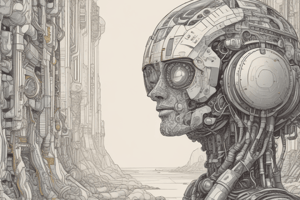Podcast
Questions and Answers
What is the primary goal of cognitive science regarding thinking?
What is the primary goal of cognitive science regarding thinking?
- To describe and explain various types of thinking. (correct)
- To improve the speed of thinking processes.
- To focus solely on instances where thinking leads to poor decisions.
- To only describe different kinds of problem-solving.
Which of the following best describes the capabilities of the mind in relation to the world?
Which of the following best describes the capabilities of the mind in relation to the world?
- The mind is limited by the sparse, noisy, and ambiguous data it receives.
- The mind only processes generalizations from direct experiences.
- The mind constructs detailed models of the world from limited data. (correct)
- The mind struggles to create inferences due to data limitations.
A cognitive scientist is studying how people quickly understand visual scenes. Which question aligns with this research?
A cognitive scientist is studying how people quickly understand visual scenes. Which question aligns with this research?
- How do people solve complex mathematical problems?
- How do people memorize lists of objects?
- How do people identify objects and their locations in a scene? (correct)
- How do people describe abstract concepts?
Concept learning extends beyond simple classification. What does it also encompass?
Concept learning extends beyond simple classification. What does it also encompass?
Which of these is an example of an everyday prediction problem?
Which of these is an example of an everyday prediction problem?
What do cognitive scientists believe knowledge in the mind primarily consists of?
What do cognitive scientists believe knowledge in the mind primarily consists of?
What is MOST accurate regarding the role of mental procedures?
What is MOST accurate regarding the role of mental procedures?
What constitutes reasoning in the context of cognitive science?
What constitutes reasoning in the context of cognitive science?
If you observe that every cat you've seen is black, and conclude that all cats are black, what type of reasoning are you using?
If you observe that every cat you've seen is black, and conclude that all cats are black, what type of reasoning are you using?
In a grocery store, employees wearing football jerseys every Friday to support the local team can lead to what kind of reasoning?
In a grocery store, employees wearing football jerseys every Friday to support the local team can lead to what kind of reasoning?
What characterizes deductive reasoning?
What characterizes deductive reasoning?
What conclusion can be drawn if the premises in deductive reasoning are correct?
What conclusion can be drawn if the premises in deductive reasoning are correct?
If you observe several black marbles being drawn from a bag and conclude that all marbles in the bag are black, what type of reasoning are you using?
If you observe several black marbles being drawn from a bag and conclude that all marbles in the bag are black, what type of reasoning are you using?
Which of the following describes a key limitation of deductive reasoning?
Which of the following describes a key limitation of deductive reasoning?
Which of the following is a key characteristic of inductive reasoning?
Which of the following is a key characteristic of inductive reasoning?
In argument terminology, what does 'valid' refer to?
In argument terminology, what does 'valid' refer to?
What do the computational procedures operating on representational structures in the mind enable, according to the central hypothesis of cognitive science?
What do the computational procedures operating on representational structures in the mind enable, according to the central hypothesis of cognitive science?
What does the acronym CRUM stand for in the context of cognitive science?
What does the acronym CRUM stand for in the context of cognitive science?
What does 'mental representation' refer to in the context of cognitive science?
What does 'mental representation' refer to in the context of cognitive science?
In knowledge representation, how does the use of formalisms benefit complex systems?
In knowledge representation, how does the use of formalisms benefit complex systems?
Which of the following best characterizes the purpose of knowledge representation?
Which of the following best characterizes the purpose of knowledge representation?
Which structure is NOT one of the three main components of a classic rules-based system?
Which structure is NOT one of the three main components of a classic rules-based system?
What does the inference engine do in a rules-based system?
What does the inference engine do in a rules-based system?
Which of the following represents a key limitation of rules-based systems?
Which of the following represents a key limitation of rules-based systems?
What benefit do taxonomies give in the context of knowledge representation?
What benefit do taxonomies give in the context of knowledge representation?
What is a Bayesian network particularly useful for modeling?
What is a Bayesian network particularly useful for modeling?
In a Bayesian network diagram, what do arcs represent?
In a Bayesian network diagram, what do arcs represent?
What makes Bayesian networks more difficult to work with?
What makes Bayesian networks more difficult to work with?
How do cognitive scientists propose that people produce thoughts and actions?
How do cognitive scientists propose that people produce thoughts and actions?
In the context of visual perception, what cognitive task is most essential?
In the context of visual perception, what cognitive task is most essential?
What is the relationship between the premise and conclusion in deductive reasoning?
What is the relationship between the premise and conclusion in deductive reasoning?
What is the main difference between inductive and deductive reasoning concerning evidence?
What is the main difference between inductive and deductive reasoning concerning evidence?
What is the main goal of studying the mind in cognitive science?
What is the main goal of studying the mind in cognitive science?
What is the overall term for using various types of thinking in Cognitive Science?
What is the overall term for using various types of thinking in Cognitive Science?
Which way describe one characteristic of inductive reasoning?
Which way describe one characteristic of inductive reasoning?
Where does knowledge exist for most cognitive scientists?
Where does knowledge exist for most cognitive scientists?
Which statement best describes the difference between deduction and induction?
Which statement best describes the difference between deduction and induction?
Which statement best describes the difference between deduction and induction?
Which statement best describes the difference between deduction and induction?
What are knowledge representation and reasoning technologies used for?
What are knowledge representation and reasoning technologies used for?
What is the purpose of rule-based systems?
What is the purpose of rule-based systems?
Why have Bayes nets emerged as an important technology?
Why have Bayes nets emerged as an important technology?
Flashcards
Cognitive Science
Cognitive Science
An investigatory discipline exploring intelligence and the human mind through various types of thinking.
Cognition
Cognition
Using various types of thinking, such as decision-making, emotions, language, learning, perception, and problem-solving.
How minds work
How minds work
Building rich models of the world and making strong generalizations from limited, ambiguous data.
Reasoning
Reasoning
Signup and view all the flashcards
Deductive Reasoning
Deductive Reasoning
Signup and view all the flashcards
Inductive Reasoning
Inductive Reasoning
Signup and view all the flashcards
Deduction
Deduction
Signup and view all the flashcards
Induction
Induction
Signup and view all the flashcards
Tautologies
Tautologies
Signup and view all the flashcards
Argument
Argument
Signup and view all the flashcards
CRUM
CRUM
Signup and view all the flashcards
Mental Representation
Mental Representation
Signup and view all the flashcards
KRR
KRR
Signup and view all the flashcards
Rule-Based Systems
Rule-Based Systems
Signup and view all the flashcards
MYCIN System
MYCIN System
Signup and view all the flashcards
Working Memory
Working Memory
Signup and view all the flashcards
Taxonomy
Taxonomy
Signup and view all the flashcards
Bayesian Networks
Bayesian Networks
Signup and view all the flashcards
Bayes nets
Bayes nets
Signup and view all the flashcards
Study Notes
- Cognitive science explores intelligence and the human mind as an investigatory discipline.
Cognition
- Cognition involves various types of thinking.
- Decision-making is a type of thinking.
- Emotions are a type of thinking.
- Language is a type of thinking.
- Learning is a type of thinking.
- Perception is a type of thinking.
- Problem-solving is a type of thinking.
Cognitive Science Disciplines
- Cognitive science includes a wide range of approaches, methodologies and disciplines.
- Artificial intelligence (AI) is included in cognitive science.
- Anthropology is included in cognitive science.
- Computer science is included in cognitive science.
- Linguistics is included in cognitive science.
- Neuroscience is included in cognitive science.
- Philosophy is included in cognitive science.
- Psychology is included in cognitive science.
How the Mind Works
- Minds construct rich world models.
- Minds make strong generalizations from sparse, noisy, ambiguous input data.
- A question is how the mind extracts so much from so little, so quickly, flexibly, and with so little energy.
- The mind recovers the surrounding world from a mere glance.
- Humans learn generalizable concepts from a single instance.
- Causal relationships are discovered from a single observation.
- Seeing forces and recognizing other minds occurs from the motion of 2D shapes.
- Humans can learn games, solve problems, and act in new environments in under a minute.
- Understanding written words is a complex cognitive process.
- Visual scene perception allows for identification of objects like people, books and glasses.
- Concept learning goes beyond simple classification of objects.
Everyday Predictions
- How much money will a movie make in total if has already made $60 million?
- How long until somethings ready if it has baking in the oven for 34 minutes?
- How long someone has left to live if 78 years old?
- How long the poem is if a friend quotes from line 17?
- How long will a US congressman serve if they have already served 11 years?
- What is the total extent or duration ttotal of an event with and unknown extent or duration?
Studying That Suits You
Use AI to generate personalized quizzes and flashcards to suit your learning preferences.




